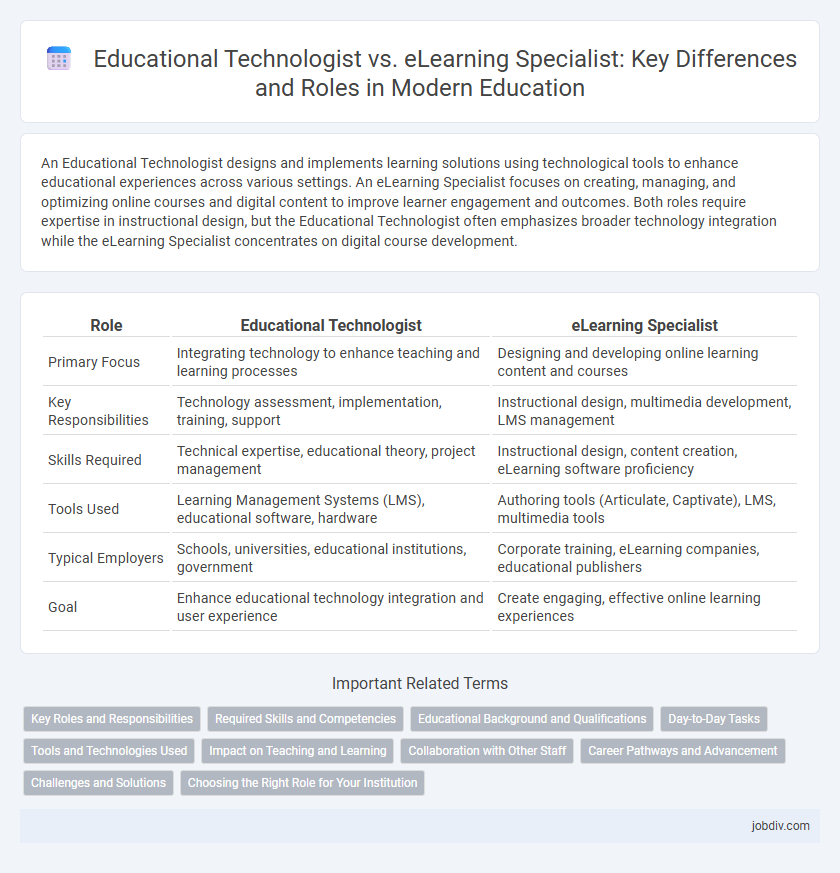An Educational Technologist designs and implements learning solutions using technological tools to enhance educational experiences across various settings. An eLearning Specialist focuses on creating, managing, and optimizing online courses and digital content to improve learner engagement and outcomes. Both roles require expertise in instructional design, but the Educational Technologist often emphasizes broader technology integration while the eLearning Specialist concentrates on digital course development.
Table of Comparison
| Role | Educational Technologist | eLearning Specialist |
|---|---|---|
| Primary Focus | Integrating technology to enhance teaching and learning processes | Designing and developing online learning content and courses |
| Key Responsibilities | Technology assessment, implementation, training, support | Instructional design, multimedia development, LMS management |
| Skills Required | Technical expertise, educational theory, project management | Instructional design, content creation, eLearning software proficiency |
| Tools Used | Learning Management Systems (LMS), educational software, hardware | Authoring tools (Articulate, Captivate), LMS, multimedia tools |
| Typical Employers | Schools, universities, educational institutions, government | Corporate training, eLearning companies, educational publishers |
| Goal | Enhance educational technology integration and user experience | Create engaging, effective online learning experiences |
Key Roles and Responsibilities
Educational Technologists design and implement effective learning environments by integrating technology with pedagogical strategies to enhance student engagement and achievement. eLearning Specialists focus on developing, managing, and optimizing digital learning content and platforms, ensuring accessibility, interactivity, and alignment with instructional goals. Both roles require expertise in instructional design, but Educational Technologists emphasize systemic educational innovation while eLearning Specialists prioritize technical execution and learner experience in digital formats.
Required Skills and Competencies
Educational Technologists require strong instructional design expertise, proficiency in learning management systems (LMS), and knowledge of multimedia production to develop effective educational tools. eLearning Specialists must excel in digital content creation, usability testing, and integration of interactive technologies to enhance online learning experiences. Both roles demand skills in data analytics to assess learner outcomes and adapt strategies accordingly.
Educational Background and Qualifications
Educational Technologists typically hold degrees in instructional design, educational technology, or computer science, emphasizing a strong foundation in both pedagogy and technology integration. eLearning Specialists often possess qualifications in multimedia design, communication, or education, with expertise in developing digital content and user experience for online learning platforms. Both roles demand proficiency in learning theories, but Educational Technologists usually require more advanced technical skills and certifications related to learning management systems and software development.
Day-to-Day Tasks
Educational Technologists design and implement instructional materials by integrating technology to enhance learning experiences, often collaborating with faculty to select appropriate tools and software. eLearning Specialists develop online courses and manage digital platforms, focusing on content creation, learner engagement, and technical support for virtual education environments. Both roles require strong technical skills and pedagogical knowledge but differ in emphasis on technology integration versus online content delivery.
Tools and Technologies Used
Educational Technologists utilize a wide range of instructional design software, learning management systems (LMS) such as Blackboard and Moodle, and multimedia authoring tools to create effective learning environments. eLearning Specialists primarily focus on developing online courses using tools like Articulate Storyline, Adobe Captivate, and video editing software, emphasizing user experience and interactive content delivery. Both roles integrate emerging technologies such as virtual reality (VR), gamification platforms, and analytics tools to enhance learner engagement and track educational outcomes.
Impact on Teaching and Learning
Educational Technologists design and implement technology-driven solutions to enhance curriculum delivery, fostering interactive and personalized learning environments. eLearning Specialists focus on creating digital content and managing online course platforms, ensuring engaging and accessible education for diverse learners. Their combined impact improves pedagogical strategies, increases student engagement, and supports scalable, data-informed learning outcomes.
Collaboration with Other Staff
Educational Technologists collaborate closely with teachers, curriculum designers, and IT staff to integrate technology effectively into instructional practices and learning environments. eLearning Specialists work alongside instructional designers, content developers, and multimedia experts to create engaging, interactive digital courses that meet educational objectives. Both roles require strong teamwork skills to ensure seamless technology implementation and enhanced student learning outcomes.
Career Pathways and Advancement
Educational technologists often pursue careers in instructional design, curriculum development, and educational research, advancing to roles such as instructional coordinators or director of technology in educational institutions. eLearning specialists typically focus on developing and implementing online learning solutions, progressing toward positions like eLearning manager, digital learning strategist, or LMS administrator. Both career pathways emphasize continuous skill development in technology integration and pedagogy, with advancement opportunities influenced by expertise in emerging educational technologies and project management.
Challenges and Solutions
Educational Technologists face challenges integrating diverse technologies into existing curricula while ensuring user accessibility and engagement. eLearning Specialists often encounter difficulties in designing interactive content that meets diverse learner needs and tracks performance effectively. Both roles benefit from continuous professional development, agile software solutions, and data-driven feedback loops to enhance instructional design and technology adoption.
Choosing the Right Role for Your Institution
Educational Technologists design and implement broad technology strategies to enhance institutional learning environments, focusing on integrating diverse digital tools across various departments. eLearning Specialists concentrate on creating and managing specific online course content, ensuring effective virtual learning experiences tailored to student needs. Selecting the right role depends on whether the institution requires comprehensive technology planning and infrastructure or targeted expertise in digital course development and delivery.
Educational Technologist vs eLearning Specialist Infographic

 jobdiv.com
jobdiv.com